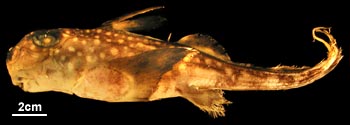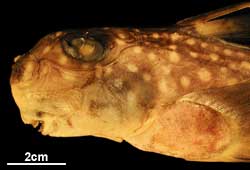Coming soon!
 |
The whole specimen. Click for larger image.
|
 |
Closeup of the head. Click for larger image.
|

About the Species
This whole, preserved specimen of Hydrolagus colliei was collected from San Juan Channel, Friday Harbor, WA on 15 August 2001 by Dr. Adam Summers of the University of California at Irvine for whom it was also scanned. Funding for scanning was provided by a National Science Foundation Digital Libraries Initiative grant to Dr. Timothy Rowe of the Department of Geological Sciences, The University of Texas at Austin.
 |
The whole specimen. Click for larger image.
|
 |
Closeup of the head. Click for larger image.
|

About this Specimen
This specimen was scanned for Dr. Adam Summers of the University of California at Irvine by Richard Ketcham and Matthew Colbert on 15 April 2002. The head was scanned along its coronal axis for a total of 465 1024x1024 pixel slices. Each slice is 0.1187 mm thick, with an interslice spacing of 0.1187 mm and a field of reconstruction of 50 mm. 
About the
Scan
Literature
& Links
None available.

Additional
Imagery
|

